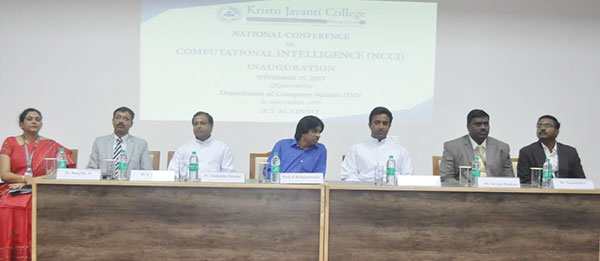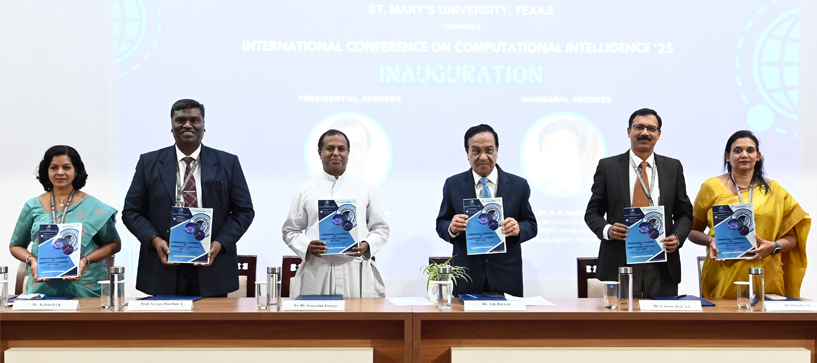
Department Conferences
8th International Conference on Computational Intelligence (ICCI-2025)
8th International Conference on Computational Intelligence (ICCI-2025) - Proceedings [click here to view]
Date:27 February 2025
The 8th International Conference on Computational Intelligence (ICCI-2025) commenced on Thursday, February 27,2025, organized by the Department of Computer Science (UG) at Kristu Jayanti College, is being held in collaboration with St. Mary’s University, Texas, USA, and is associated with Sophia University, Tokyo, Japan, and the University of Neu-Ulm, Germany. The conference theme, "Converging computational excellence to transcend boundaries through innovation for real-world challenges" was unveiled to promote networking and collaboration among participants. This prestigious event serves as a significant platform for exploring cutting-edge advancements, key methodologies, research trends, challenges, and unresolved issues in the field of Computational Intelligence. ICCI-2025 brings together leading researchers, engineers, scientists, and students from across the country, offering a dynamic space to present and discuss groundbreaking research in computational science. The inaugural session was graced by Dr. A.K. Bakhshi was the Chief Guest, who emphasized the profound impact of research across various domains. He underscored the importance of innovation, collaboration, and transformative progress in research, highlighting how Computational Intelligence is revolutionizing technology, reshaping industries, and influencing societies on a global scale. Encouraging participants to actively engage in the conference, he urged them to ignite new ideas, pursue pioneering research, and contribute to a smarter, more interconnected world. The conference received an overwhelming response, with 213 research articles submitted from across the globe, reflecting the latest trends and innovations in Computational Intelligence. The event features a keynote session, seven technical tracks, and multiple paper presentations, all focusing on emerging technologies and future research directions.

Two-Day International Conference On Computational Intelligence (ICCI 2024)
Two-day International Conference on Computational Intelligence (ICCI 2024) - Proceedings [click here to view]
Date: 26 February 2024
The Two-Day International Conference on Computational Intelligence (ICCI 2024) commenced on Monday, February 26, 2024, organized by the Department of Computer Science, Kristu Jayanti College, in collaboration with Lincoln University College Malaysia and Karnataka State Council for Science and Technology. The event began with an invocation song by the college choir, followed by keynote speeches from Dr. Clive VanBuerle, Executive Director, OBS India and Dr. Srihari Murthy, CEO and Co-founder Factri.ai, Bengaluru emphasizing the collaboration between industry and academia, as well as the innovative use of technology with insights on ethical AI deployment. The conference theme, "Navigating the Frontiers of Computational Intelligence," was unveiled to promote networking and collaboration among participants. During the presidential remarks, Fr. Dr. Augustine George, Principal of Kristu Jayanti College, highlighted the importance of holistic research development in educational institutions and shared the institution's vision, mission, goals, and qualitative journey over the years.
Technical Session-I was inaugurated by Dr. Srinivasulu from NIT Trichy, who delivered an insightful presentation on the evolution of Artificial Intelligence (AI), spanning from its historical progression to current advancements. The session provided a comprehensive overview of AI techniques, including rule-based systems, machine learning, and deep learning approaches, and discussed their applications across various domains. Technical Session-II, led by Dr. Susheela Devi from IISC-Bengaluru, explored the "Magic of Generative AI." Dr. Devi showcased the innovative capabilities of Generative Artificial Intelligence in creating realistic content across domains such as art, music, and literature, and discussed its transformative impact on industries through real-world examples and case studies. Technical Session III focused on Research on Social Impact, with Dr. Sujit Kumar Chakrabarti from IIIT-Bengaluru. The session delved into leveraging computational intelligence for addressing societal challenges and fostering interdisciplinary collaboration and innovation.
Technical Session- IV addressed Ethical Considerations in Data Analytics, led by Dr. Divya Midhun Chakkaravathy from Lincoln University Malaysia. The session stimulated critical discourse on responsible data usage and societal impact in data analytics research and applications. The technical session was followed by paper presentations by various participants from different colleges.
Day one of the ICCI 2024 conference ended with diverse aspects of computational intelligence, covering topics from AI evolution to Generative AI and data analytics ethics. Engaging sessions led by experts fostered collaborative learning, leaving attendees with enriched perspectives and renewed enthusiasm. The conference's successful start sets a promising stage for continued innovation and collaboration in computational intelligence.
On the second day started with Technical Session V was conducted online by Dr. Midhun Chakkaravathy from Lincoln University Malaysia. His presentation explored cutting-edge research and practical applications in computational intelligence, fostering a collaborative environment for attendees to deepen their understanding and push boundaries in the field. Technical Session -VI, led by Dr. Meenakshi D'Souza from IIIT-Bengaluru, focused on Testing of IoT Applications. Dr. D'Souza provided insights into the latest advancements and research trends in computational intelligence, fostering thought-provoking discussions and equipping participants with fresh insights. Technical Session VII concluded the conference, with Mr. Rinka Singh, Cyber Security Head at iSprit, Bengaluru, delivering an insightful presentation on "Research Scope in Cyber Security." Mr. Singh's thorough analysis of cybersecurity threats and research avenues empowered attendees to contribute meaningfully to cybersecurity research and innovation.
The day two technical sessions marked not only the end of the event but also a culmination of collaborative efforts, insightful discussions, and impactful presentations. Participants departed with renewed inspiration, enriched knowledge, and a strengthened network, poised to continue their journey of exploration and innovation in the realm of computational intelligence.
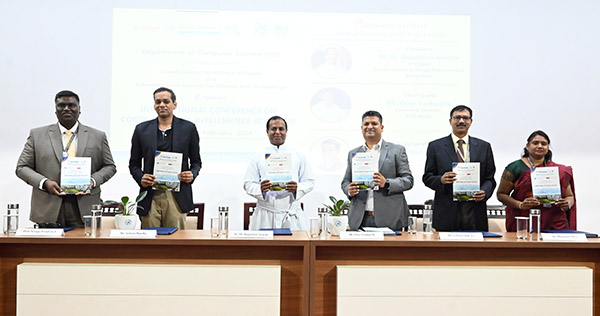
National Conference On Recent Trends on Electronics, Mathematics & Statistics - NCRTEMS’23
Date: 03-03-2023
Departmental Technical Sessions:
2.1 Electronics Technical Sessions:
The Electronics Department organized two distinct technical sessions that focused on different aspects of the field. The sessions aimed to cover a wide range of topics, including emerging technologies, circuit design, signal processing, and communication systems. Renowned experts in the field delivered insightful presentations, highlighting the recent developments and future prospects in electronics.
2.2 Mathematics Technical Sessions:
The Mathematics Department also conducted two technical sessions, each concentrating on diverse areas within mathematics. The sessions encompassed topics such as applied mathematics, mathematical modeling, optimization, and numerical analysis. Esteemed mathematicians and researchers shared their expertise, shedding light on the latest trends and methodologies in the field.
2.3 Statistics Technical Sessions:
The Statistics Department organized two technical sessions to explore various facets of statistics. The sessions covered areas such as data analysis, statistical modeling, machine learning, and statistical inference. Accomplished statisticians and data scientists presented their research findings, introducing novel techniques and approaches that are revolutionizing the field.
Paper Presentations:
Following the technical sessions, the conference featured paper presentations, where participants had the opportunity to present their research work and findings. Authors submitted their papers in advance, which underwent a thorough review process by the conference committee. The selected papers were then categorized based on their relevance to electronics, mathematics, or statistics.
During the paper presentations, researchers presented their work in front of a knowledgeable audience comprising fellow researchers, faculty members, and industry experts. Each presenter had a designated time slot to deliver their presentation, followed by a question-and-answer session, which encouraged valuable discussions and exchanges of ideas.
Keynote Addresses and Panel Discussions:
In addition to the technical sessions and paper presentations, the conference also featured keynote addresses by eminent personalities from the fields of electronics, mathematics, and statistics. These distinguished speakers shared their insights on the current trends, challenges, and future directions of their respective disciplines.
Furthermore, panel discussions were organized to provide a collaborative platform for experts and attendees to engage in thought-provoking conversations. These discussions revolved around specific themes and topics, allowing participants to delve deeper into the emerging trends and potential applications within electronics, mathematics, and statistics.
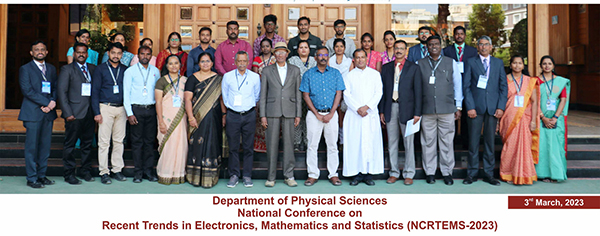
International Virtual Conference - ICRTMS 2023
Date: 07-03-2023
International Conference on Recent Trends in Materials Science started with the invocation followed by a welcome address by Dr Calitus Jude A L, Dean Faculty of Sciences. A brief overview of the conference was given by Conference Co-convenor Dr Shivaraj Maidur. Rev. Fr. Fr. Joshy Mathew, Director, Library and Information Centre, Director- HR Department, Head, Department of English in his inaugural address, highlighted the use of materials science in day-to-day life and its relevance in the development of new technologies, and also congratulated the department. The chief guest, Prof. Karuna Kar Nanda, Director, Institute of Physics(IOP), Bhubaneswar - 751005, India emphasized the relevance of research in materials science in the current scenario and the use of materials research in all the fields. The Conference abstract book was also released by the dignitaries.
One keynote session and three technical sessions were conducted. In the keynote session: Resource person Prof. Karuna Kar Nanda, Director, Institute of Physics(IOP), Bhubaneswar - 751005, who spoke on the topic of “Breathing of Nanostructured Materials” where he elaborated Adsorption of oxygen on materials surface is essential for a variety of applications including gas sensing, photodetection, pressure sensing, oxygen reduction reaction, oxidation and in monitoring several properties such as hydrophobicity, conductivity, nature of doping, work function and etc. He explained the key applications and properties of various carbon and oxide nanostructures associated with oxygen adsorption and provided a correlation among them.
In Technical session-1: Nonlinear Optical Applications of Novel Materials, by Prof. Reji Philip, Senior Professor, Ultrafast and Nonlinear Optics (UNO) Lab, Light and Matter Physics (LAMP) Group, Raman Research Institute Bangalore – 560080, India emphasized the second and third order nonlinear optical effects, experimental techniques and the application of some novel material in optical limiting devices. He highlighted some of the materials such as carbon nanotubes Fullerene and organic dyes for optical limiting applications. It was surely a very informative session.
In Technical session-2: Modelling the Mechanical Behaviour of Shape Memory Helical Springs, Dr R. Santhanam, Senior Scientist, Aerospace Structures Division, Defence Research and Development Laboratory (DRDL), Ministry of Defence, Hyderabad, India explained the behaviour of Shape Memory Helical Springs and described SMA springs can be used for high-performance soft actuation. Different characterizations of SMA springs were discussed. He presented a study on variation in coil diameter of SMA springs, the development of constitutive modes for SMA springs and the effect of geometric properties of bias springs actuation. The session was interactive and the speaker covered all key concepts.
Dr. Madan Kumar Shankar, Postdoctoral Researcher, Department of Physics, Uppsala University, Sweden elaborated on the Time-resolved Serial Femtosecond Crystallography of Photoactive Protein in detail, briefing her research and experiences.
Paper Presentation sessions were chaired by Dr Basavaraj Angadi, Professor, Bangalore University, Bengaluru, and Dr E. Parasuraman, Assistant Professor, Indian Academy Degree College, Bangalore. The papers reflected current trends in materials science and condensed matter physics, Solar cells, Superconductors, Nanoscience, and catalysis to name a few.
The conference was attended by more than 162 participants (within and outside the Nation) and a total of 55 technical papers (including eight posters) on various topics in materials science were received and out of which 38 (including six posters) papers were presented by the authors. All accepted and presented papers will be published in the Chemical physics impact journal (SCOPUS Indexed) and UGC-indexed journals.
After the paper and poster presentation Dr. Nagaraju, Vice President, of the Indian Association of Physics Teachers South zone gave concluding remarks about the keynote sessions, technical sessions and oral and poster presentations. He also announced the best papers and poster awards. Prof. Somasekara, Former Principal and IAPT member and Dr Nagaraju, Vice President, of the Indian Association of Physics Teachers south zone presented the cash prizes with certificates to the winners.
Outcome: ICRTMS 2023 was a good platform to discuss the recent trends in materials science and shared the experiences, perspectives and responses to the challenges faced by the researchers, and to set new goals for the future. The conference provided the participants with an opportunity to expand their network and exchange knowledge and ideas among fellow researchers, academicians and technical experts from diverse areas towards the common goal of shaping the future of society through materials research.
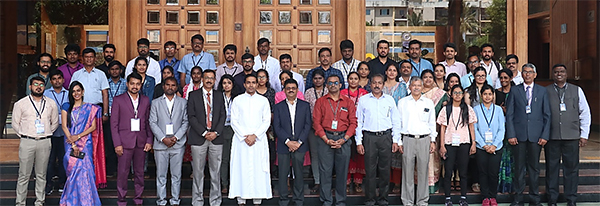
Two-day National Conference on Science and Technology - Computational Intelligence (NCCI 2023)
Two-day National Conference on Science and Technology - Computational Intelligence (NCCI 2023) - Proceedings
[click here to view]
The Department of Computer Science, Kristu Jayanti College, (Autonomous) in association with the University of Calcutta organized a two-day National conference on “Science and Technology - Computational Intelligence” which began on Monday, Tuesday, January 30, and 31, 2023.
The inauguration ceremony of the NCCI 2023 started with a warm welcome extended by Dr. Calistus Jude, Dean, Faculty of Sciences, and the prelude by Dr. K Kalaiselvi, convener of the conference. Fr. Dr. Augustine George, Principal, of Kristu Jayanti College delivered the Presidential address through which he emphasized on competencies, innovation, learning, and research. Father elaborated on associative, observative, innovative, experimental, and questioning capacities. The chief guest, Mr. Rostow Ravanan delivered the inaugural address in which he emphasized the importance of an individual’s development as a computer science professional, development of character, and growth as an individual. he instilled in the audience a sense of confidence and encouraged them to develop fortitude and cultivate habits such as truthfulness, charity, and forgiveness. Prof. Sevuga Pandian, head, of the department of computer science, proposed the vote of thanks after the official release of the conference abstract proceeding.
Technical Session I started by Dr. Kunal, Professor, Electrical department, IISc, Bangalore. The discussion was mainly about the use of deep learning techniques in the field of computational imaging. Dr.Kunal explained the difference between classical and deep learning. He familiarized the audience with the various reasons behind the success of neural networks. He delivered an in-detail explanation of imaging modalities, the MRI (Magnetic Resonance Imaging) system, and CT (Computerized Tomography) scans. He spoke about Biological Neural Networks and CNN (Convolutional neural networks) and about the new era of computational imaging. He covered major aspects of visual analytics, image classification, image reconstruction, etc.
Technical Session II was handled by Prof. Amlan Chakrabarti, Director, AK Choudhury, School of Information Technology, University of Calcutta. The agenda of this session was to familiarize the audience with the concept of water informatics and the machine learning techniques used for the same. The primary focus was to understand the digital solutions to the water industry and to be able to correlate the solutions with their region-specific problems and thereby generating new innovative ideas. He explained how machine learning can automate, simplify and improve many aspects of water monitoring including improving modeling and analysis, detecting and correcting equipment malfunctions, detecting environmental anomalies, predicting the effects of policy decisions, and controlling allocation and distribution.
Technical session III on 31 January 2023 was handled by Mr. Ajith Mathew George, Co-founder and Director-Technology at SYSFORE This seminar was focused on tackling digital transformational challenges like budgets, time resources, expectations from customers, cybersecurity, changing workforce, surging digital demand, etc. and on how people who have no knowledge about programming can build applications. Mr. Ajith emphasized the importance of no-code and how it helps in gaining speed in creating applications. The no-code movement refers to an ecosystem of tools and platforms that lets anyone build and launch software without learning how to code. He spoke about various no-code tools, and the environment for the creation of such applications and also provided a live demonstration.
The last technical session on 31 January was started by the session by Ms. Priyanka. She highlighted the importance of blockchain and how it was revolutionizing the world. She pointed out its key features such as decentralization, immutability, and consensus. She threw light on the evolution of blockchain and emphasized why data security and transparency needed advancement and the various blockchain security measures and how it works. Blockchain networks and their features, various blockchain protocols, and usage of blockchain as a service were the highlights of the session.
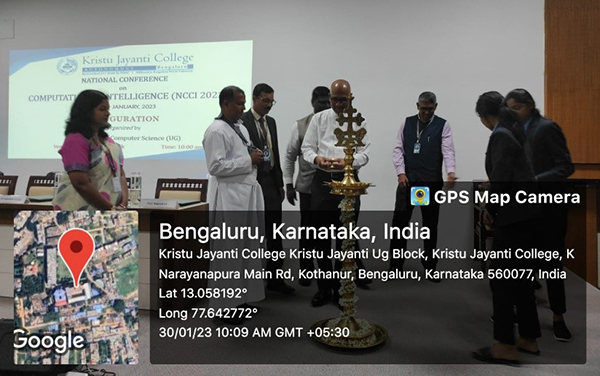
Two - day International Conference on Science and Technology - Computational Intelligence (INCCI 2022)
The Department of Computer Science, Kristu Jayanti College, (Autonomous) in association with Indian Science Congress Association (ISCA), Bangalore Chapter, organized a two-day international conference on “Science and Technology - Computational Intelligence” which began on Tuesday, March 15, 2022.
The event started with an invocation song by the college choir, followed by a welcome address by Dr. Gangadhar, Organising Secretary, and Convener, (ISCA). Delivering the inaugural address, Dr. Vijay Laxmi Saxena, General President, ISCA, congratulated everyone for the hybrid conference keeping in mind the COVID-19 situation. She said that Computational Intelligence (CI) is the need of the hour, especially after how it is helping with the pandemic. She mentioned with advancements that there is nothing a human brain can do and a computer cannot do. “Computational Intelligence is the way of computers/machines performing like human being”, explained Dr. Saxena while imparting knowledge about computational intelligence. She explained how we start by crawling, walking and running in the same way we must advance technology. Mr. Saxena inaugurated the event with hope.
During the presidential remarks, Fr. Dr. Augustine George, Principal, Kristu Jayanti College emphasized the importance of holistic development of research in the educational institutions. He also mentioned the vision, mission, goals and qualitative journey of the institution in the past years.
Prof. Venugopal K R, Vice-Chancellor, Bangalore University, who holds an experience of more than 42 years in academics, pointed out that machine learning and artificial intelligence have encompassed advancements in the field.
Dr. Aravind Kumar Saxena, General President Elect, ISCA, appreciated the hybrid mode of the conference as it facilitates diverse groups of scientists and people from different areas to come together to educate everyone and each other. He also mentioned that the importance of Computational Intelligence and emphasized that reduces a lot of experimental work and is a sustainable process.
Dr. K.S. Rangappa, Immediate Past General President, ISCA, emphasized choosing the right concepts in innovations in science and technology. He mentioned that qualified and trained manpower show unbelievable results in AI and Machine Learning. A desire to know the unknown is the start of powerful and rewarding science. He further said that CI provides success stories that are hard to justify by traditional ways.
Dr. Ashok Kumar Saxena, Former President, ISCA released souvenirs for the occasion and Prof. Sevuga Pandian, Head, Department of Computer Science, Kristu Jayanti College, rendered the vote of thanks to everyone for their thought provoking speeches, words of wisdom, sharing the knowledge and gracing the event with their presence. The inaugural ceremony was concluded with Jayantian Anthem sung by the college choir.
Technical Session I started by Dr. Paras Nath Singh, President ICTCS, Indian Science Congress 2021 – 2022 on the topic ‘Power of Python’. The speaker introduced Python and its origin to the audience. He spoke about Python’s unique feature of integrating with conditional and control statements.
Technical Session II was handled by Dr. R Devika Rubi, R & D member, KMIIT, Hyderabad on AI in healthcare. The speaker brings to light, the significance of AI in decision making with respect to the radiology and pathology department. She introduced the audience to treatment and diagnosis using Artificial Intelligence and its ability to predict the outcome of a patient.
Technical Session III on Soft Computing for Machine Learning delivered by Ms. V Susheela Devi, Principal Research Scientist, Dept. of Computer Science and Automation, IISc. The speaker mentioned that the system adapts itself to solve a problem while tolerating imprecision, uncertainty, partial truth and approximation.
The technical session was followed by paper presentations by various participants from different colleges in India.
The first day ended with the technical session on ‘Computational Intelligence and our society’ by Dr. Lakshmi S Iayer, Acting Associate Dean for graduate programs and research, Appalachian State University, USA. The speaker introduced Artificial Intelligence and its features, comparing it with machine learning. She briefed the audience on Ant Colony optimization, a probabilistic technique for solving computational problems which can be reduced to finding the best path through graphs, and its applications.
Day two started with paper presentations by the participants followed by a technical session on Open Source – ‘How to Contribute and Create an Impact’ by Mr. Ashit Kumar, Lead Architect, Huawei Technologies. He emphasizes on the 4 main aspects of the Open Source aspect: Understand, Identify, Setup and finally contribute. He then introduced the audience to the SODA foundation, which is a sub-Foundation under Linux.
Technical session VI delivered by Dr. Ranjitha M, Associate Professor, Dept. of Computer Science, Kristu Jayanti College, on Medical Image Analysis from Healthcare Perspective. She spoke about the importance given to computer aided diagnostics (VR and robotics) leading to more accurate results.
The two days international conference ended with the valedictory ceremony. The valedictory function of INCCI 2022 started at 2 pm. The Chief Guest of the valedictory function was Dr. Hanumanthappa, Professor and chairman, Department of Computer science and application, followed by a Welcome address of the valedictory given by Dr. R Kumar, Head Department Of Computer Science (PG), Kristu Jayanti College, Bangalore. The Guest of Honor for the valedictory was Dr. Santhaveerana Gouda B N, Department of Civil Engineering, Bangalore University. The conference Report presented by the Conference Convener Prof. G Prathap -,Assistant Professor ,Department Of Computer Science , Kristu Jayanti College followed by the Vote of thanks by Dr. Margaret Mary- , Conference Convener, Assistant Professor ,Department Of Computer Science, Kristu Jayanti College.
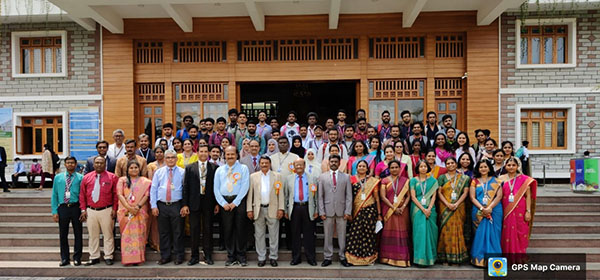
Virtual National Conference on “Recent Trends in Pure and Applied Mathematics”
Date: 11 & 12, November 2021
Number of beneficiaries: 250 | In-house: 150 | External: 100
The Virtual National Conference on “Recent Trends in Pure and Applied Mathematics” was organized by the department of mathematics in association with Department of Mathematics Bengaluru North University on 11 and 12th , November 2021.
In the inaugural session Convener of the conference Dr. Shiva Kumar B.N., Asst. Professor, Department of Mathematics, Kristu Jayanti College welcomed the dignitaries and the participants.
Prelude to the conference was presented by Dr. Mamatha S Upadhya., Asst. Professor, Department of Mathematics, Kristu Jayanti College she gave an overview of the objective and the keynote session and details of the research papers submitted to the conference.
Fr. Dr. Augustine George, Principal of Kristu Jayanti College, Autonomous, in his presidential address emphasized about the importance of studying both pure and applied mathematics and also stated that mathematics is not merely the logic or the problem solving, mathematics help to understand and describe the world around us.
Chief Guest of the Conference, Dr. Kumuda D, In-Charge Vice-Chancellor, Bengaluru North University, highlighted the importance of National conference to the student community and researchers in the current scenario.
Guest of Honour, Dr. Pradeep G. Siddheshwar, Senior Professor of Mathematics, Centre for Mathematical Needs, Department of Mathematics, Christ University, Bengaluru, appreciated the theme of the conference and the key note address and said this conference would emphasize on how pure mathematics becomes applied mathematics.
The conference proceeding was released during the inaugural session. The Conference co -convener, Dr. Soya Mathew proposed the vote of thanks. Key Note Session I, was addressed by Dr. Pradeep G. Siddheshwar, Senior Professor of Mathematics, Centre for Mathematical Needs, Department of Mathematics, Christ University, Bengaluru. Sir, addressed about complex differential equations and how to solve such equations.
Key Note Session II, was addressed by Dr Smita S Nagouda, Associate Professor, Centre for Mathematical Needs, Department of Mathematics, Christ University, Bengaluru. Madam addressed about the importance of solving the partial differential equations by Numerical methods and madam has explained in detail about the Keller Box method.
Key Note Session III, addressed by Dr. Medha Itagi Huilgol, Associate Professor,Department of Mathematics,Bengaluru Central University, Bengaluru. Madam addressed about Marker set, marker set distance in graphs its properties and applications.
Key Note Session IV, was addressed by Dr. Kanchana C., Research Expert, Instituto de Alta Investigatión, Universidad de Tarapacá, Chile. Madam explained about what is nanoparticles, how it is prepared, what are the applications of nanoparticles in industrial fluids, how thermal conductivity improves with the addition of nanoparticles in the base fluids. What are the emerging current research areas in nanotechnology.
And fifth Key Note Session was addressed by Dr. Nagaraja H G., Professor of Mathematics, Jnana Bharathi Campus, Bangalore University, Bengaluru. Sir addressed about how to model boundary value problem and solving partial differential equations.
The two day National conference concluded with the 34 research paper presentations.
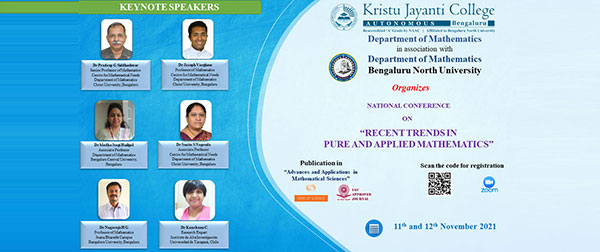
Virtual National Electronics Conference on Materials for Electronics applications (NACMEA-2021)
Department of Electronics, Kristu Jayanti College, Autonomous, Bengaluru organised a “Virtual National Electronics Conference on Materials for Electronics applications (NACMEA-2021). The aim of this conference was to bring together leading academic scientists, researchers and research scholars to exchange and share their experiences and research results on all aspects of Basic Science and Materials Sciences for Electronics applications. It also provided a premier interdisciplinary platform for researchers and educators to present and discuss the most recent innovations, trends, and concerns as well as practical challenges encountered and solutions adopted in the fields of Physics, Chemistry, Material Science and Electronics.
Rev. Dr Augustine George, Principal, Kristu Jayanti College gave a message on the theme of the conference and highlighted the importance of research in electronics field.
Dr. B B Kale, Director & Scientist-G Centre for Materials for Electronics Technology (CMET), Pune, India was the chief guest and the keynote speaker.
Dr. Binoy K Saikia, Senior Scientist CSIR-North East Institute of Science and Technology, Jorhat, Assam. Dr. Binoy presented a technical session on Nano diamonds from low-quality coals and carbonaceous aerosols: environmental care and waste to wealth.
Dr. S. K. Nataraj, Professor and Group Leader, Centre for Nano and Material Science, Jain University, Bengaluru, India. Topic of the session was Interdisciplinary Research on Materials Aiming Energy and Environmental Applications.
Dr. P. Kathirvel, Assistant Professor Department of Physics GRD, Centre for Materials Research PSG College of Technology, Peelamedu, Coimbatore, India. The resource person shared his experience during the research on Flame Synthesis of Oxide Materials.
Delegates presented their research papers during the conference.
All the selected papers for the presentation in conference will be published in IOP (Institute of Physics): Journal of Physics: Conference Series, indexed by Scopus, the world's largest abstract and citation database for peer-reviewed research, content published on IOP science is discoverable across all major discovery services.
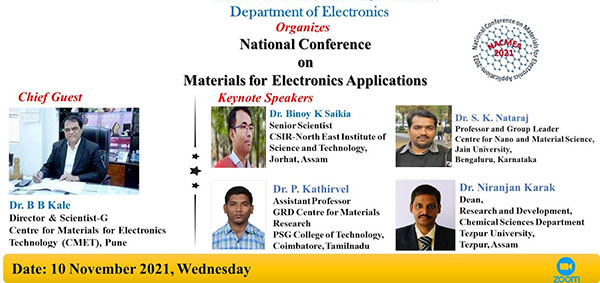
International Virtual Conference on Recent Trends in Materials Science (ICRTMS-2021)
Date: 22-10-2021
International Virtual Conference on Recent Trends in Materials Science started with the invocation followed by a welcome address by Dr. M. Ambrose Rajkumar, Conference Convener and faculty member of Physics. A brief overview of the conference was given by Conference Co-convener Dr. Ajith S Kumar. Rev.. Fr. Emmanuel. P.J, Director, Kristu Jayanti College of Law, in his inaugural address, highlighted the use of materials science in day-to-day life and its relevance in the development of new technologies, and also congratulated the department. The chief guest, Prof. P. Ramaswamy, President, Indian Association for Crystal Growth, and Dean-Research, SSN institutions, Chennai, Tamil Nadu emphasized the relevance of research in materials science in the current scenario and use of materials research in the field of medicine. The Conference proceedings were also released by the dignitaries.
Four technical keynote sessions were conducted. In keynote session-1: Resource person Dr. Muthu Senthil Pandian, Research Scientist, SSN Institutions, Chennai, Tamil Nadu, who spoke on the topic of “Development large size and unidirectional organic nonlinear optical (NLO) single crystals for second harmonic generation (SHG) application” where he elaborated the Sankara Narayana Ramaswamy method used for his research and unidirectional growth of NLO crystals and its uses.
In keynote session-2: CZT semiconductor crystal growth and characteristic for gamma-ray detector applications, by Dr. M. Magesh, Research Associate, Research Associate, Institute of Material Research, Washington State University Pullam -99613, USA emphasized on the structure of the particle, preparation, necessity and properties. It was surely a very informative session.
In keynote session-3: Composite nanoparticles for sensitive detection of hazardous gases, by Prof. Ahmad I Ayesh, Professor of Physics, Department of Math, Stat. & Physics Qatar University, Doha, Qatar explained about composite nanoparticles and detection of hazardous gases by composite nanoparticles. The session was interactive and the speaker covered all key concepts.
In keynote session-3: Composite nanoparticles for sensitive detection of hazardous gases, by Prof. Ahmad I Ayesh, Professor of Physics, Department of Math, Stat. & Physics Qatar University, Doha, Qatar explained about composite nanoparticles and detection of hazardous gases by composite nanoparticles. The session was interactive and the speaker covered all key concepts.
Prof. Teresa Cuberes, Professor, Applied Mechanics and Project, Engineering, University of Castilla-La Mancha, Spain elaborated on Composite nanoparticles for sensitive detection of hazardous gases in detail, briefing her research and experiences. She explained the advantages of Ultrasonic Force Microscope (UFM) over Atomic Force Microscope for detecting subsurface defects including dislocations, voids, and interfaces in functional materials and devices. Paper Presentation sessions were chaired by Dr. Jerald Vijay Ramaclus, Assistant Professor, St. Joseph’s College (Autonomous), Tiruchirappalli, Dr. S. Anbarasu, Assistant Professor, St. Joseph’s College (Autonomous), Tiruchirappalli, Dr. Swapna Nair, Associate Professor, Central University of Kerala, Kasargod, Kerala, and Dr. E. Parasuraman, Assistant Professor, Indian Academy Degree College, Bangalore. The papers reflected current trends in materials science and condensed matter physics, Nanoscience, and catalysis to name a few.
The conference was attended by more than 160 participants (within and outside Nation) and a total of 26 technical papers on various topics in materials science were received and out of which 21 papers were presented by the authors. All accepted and presented papers will be published in the IOP Conference Series: Material Science and Engineering (SCOPUS Indexed) and International Journal of Scientific and Engineering Research.
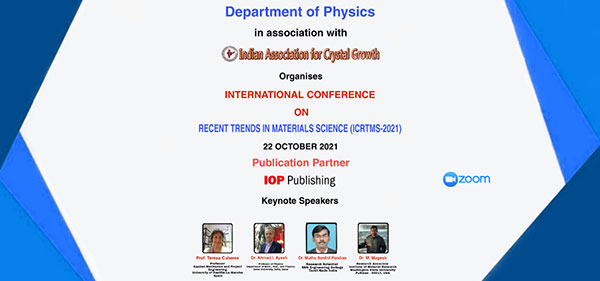
Virtual National Conference on Theoretical and Applied Statistics
Date: 09th & 10th February 2021
Number of beneficiaries: 380 | In-house: 300 | External: 80
The Virtual National Conference on Theoretical and Applied Statistics conducted on 9th and 10th of Feb was organized by the Department of Statistics in collaboration with National Statistical Office (NSO) under the Ministry of Statistics and Programme Implementation (MoSPI), Government of India (GOI), Department of Statistics, Bangalore University, Jnana Bharathi Campus and Bengaluru North University
In the inaugural session Dr. Calistus Jude, Dean of Science, Kristu Jayanti College, welcomed the dignitaries, delegates and the participants as he mentioned the importance and advancement of data in the 21st century.
Prelude to the conference was presented by Dr. Prameshwar V Pandit, Chairperson and Professor, Dept of Statistics, Bangalore University, who gave an overview of the design and purpose of the conference.
Fr. Dr. Augustine George, Principal of Kristu Jayanti College, Autonomous, in his presidential address he emphasized on the theme of the conference and mentioned how and why data and its analysis are so crucial in these modern times. We had two guest of honours, Dr. P T Subha, ISS, Deputy Director General, Zonal Office, Field Operations Division, National Statistics Office, M/o statistics & Programme Implementation who highlighted the importance of Statistical Analysis for sustainable development.
Prof. N. Balakrishna, Department of Statistics, Cochin University of Science and Technology (CUSAT), Kochi who appreciated the organizers for arranging a scholarly gathering of statisticians.
Their speech emphasized the need of more youngsters to take up higher studies in Statistics as there is a huge demand of statisticians in both industry and government sector.
Prof. D. T. Shirke, Vice Chancellor, Shivaji University, Kohlapur, honorable chief guest for the inaugural program in his inaugural address enlightened the participants on how statistics is used by everyone. He also emphasized on the role of technology in the field of statistics and gave a call to think differently in the light of the amount of unstructured data in the current world.
The conference proceeding was released during the inaugural session. The Conference convener, Ms. Liji George proposed the vote of thanks.
The two day conference include 2 key note sessions and 9 technical talks by eminent researchers from various domains of statistics and 44 contributory research paper presentations.
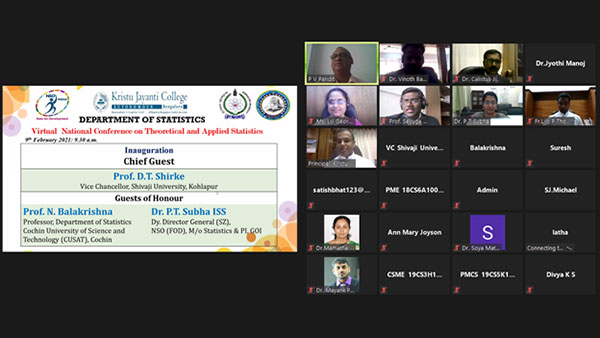
4th National Level Virtual Conference on Computational Intelligence
(NCCI 2021)
Date: 11-12 January 2021 | Intra/Inter
Number of beneficiaries: 450 | In-house: 400 | External: 50
Name and details of the Resource Person: Inauguration:
Prof. Valentina Emilia Balas, Ph.D. IEEE Senior Member Dept. of Automation & Applied Informatics Director of International Relations Head of Intelligent Systems Research Centre "Aurel Vlaicu" University of Arad, Romania
Objective: National Conference on Computational Intelligence (NCCI 2021) provides a platform to discuss the state-of-the-art developments, key approaches, research line, challenges and unsolved open problems encountered in the fields of Computational Intelligence. ICT Academy is the knowledge and publication partner of the conference and we have also been associated with Society for Data Science and IEEE Student Branch, Bangalore section.
The conference started with an invocation followed by welcome address by Prof. Divya, Faculty, Computer Science. Dr. G. Jasmine Beulah, Convener, NCCI 2021 read the Conference Prelude. Fr. Dr. Augustine George, Principal gave the Presidential Address. He focused on the various technological developments foreseen by the world in the recent future. The Chief Guest, Prof. Valentina Emilia Balas, IEEE Senior Member, Dept. of Automation & Applied Informatics, Director of International Relations, Head of Intelligent Systems Research Centre,"Aurel Vlaicu" University of Arad, Romania talked on her current research work in Renewable Energies and Passive Greenhouses at Romania and France and highlighted the relevance of Computational Intelligence. The Conference proceedings were also released by the dignitaries. The NCCI2021 Inauguration concluded with the Vote of Thanks proposed by Dr. Hubert Santhan, Co-convener, NCCI 2021.
The Inauguration was followed by two Technical Sessions. The topic of Technical Session I was on “Demystifying Data Science” by Dr. Neha Sharma, Analytics & Insights, TCS, Pune, India, Founder Secretary, Society for Data Science, Senior & Execom Member, IEEE Pune Section. She discussed the basic concepts used in the technology relating with best suitable real life examples which are essential for understanding technology. She projected a clear understanding of the roles played by modern data scientists and the importance of statistics, data mining, predictive analytics and many other related topics.
The topic of Technical Session II was “Deep Learning Approaches for Smart Health Care”, Dr. V. Gomathi, Professor & Head, Dept. of Computer Science & Engineering, National Engineering College, Kovilpatti, Tamil Nadu, India. Dr. V. Gomathi described how these computational techniques can impact a few key areas of medicine and how to build end-to-end systems. The discussion of computer vision focused largely on medical imaging, and described the application of natural language processing to domains such as electronic health record data.
The Track I Paper Presentation was chaired by Dr. Calduwel Newton, Assistant Professor, Govt. Arts College, Trichy, Tamilnadu and Dr. Murugantham, Associate Professor, Computer Science (PG), Kristu Jayanti College, Bengaluru.
The Second Day of the conference kick-started with the Technical Session III- Real-Time Use - Cases of Big Data, Mr. Vijayaraj Veeramani, Cloud Solution Leader - AP, IBM, Singapore. Mr. Vijayaraj Veeramani spoke about the applications of big data in the real world. No wonder, there is so much hype for big data, given all of its applications. The importance of big data lies in how an organization uses the collected data and not in how much data they have been able to collect. There are Big Data solutions that make the analysis of big data easy and efficient. These Big Data solutions are used to gain benefits from the heaping amounts of data in almost all industry verticals.
The Track 2 Paper Presentation followed the Technical session and was chaired by Dr. Ramkumar, Lecturer, Maldives and Dr. Vinothina, Department of Computer Science (PG). The papers presented gave extensive information and insights into Computational Intelligence and AI.
The conference was attended by more than 500 participants and a total of 50 technical papers on various topics supported by Computational Intelligence were received and out of which 23 papers were presented by the authors. All accepted and presented papers will be submitted for a possible publication in ICTACT Journal on Communication Technology (IJCT),ISSN: 2229-6948 (Online),Abstracting/Indexing: UGC CARE List - I, Google Scholar, etc. and ICTACT Journal on Soft Computing (IJSC),ISSN: 2229-6956 (Online),Abstracting/Indexing: UGC CARE List - I, Google Scholar, etc.
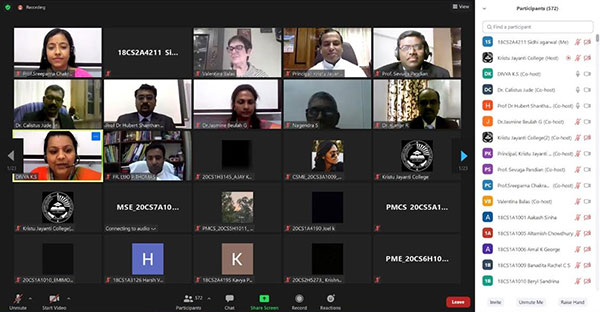
International Virtual Conference on Recent Trends in Materials Science
Date: 16-11-2020
Number of beneficiaries: 170 | In-house: 150| External: 20
Platform: Zoom
Objective: This virtual conference was aimed at disseminating knowledge in the domains of Science and Engineering. It was an opportunity to reflect on what has been happening in the field of Science and Engineering, to share the experiences, perspectives and responses to the challenges faced by the researchers, and to set new directions for the future.
The conference started with the invocation song followed by a welcome address by Dr. M. Ambrose Rajkumar, Conference Convenor and faculty member of Physics. Dr. Anoop Baby K. B., Conference Co-convenor gave a brief overview of the conference. Rev. Dr. Augustine George, Principal, Kristu Jayanti College, in his inaugural address, emphasized on the importance of materials science in day-to-day life and its relevance in the development of new technologies, and also congratulated the department. The chief guest, Dr. Sridharan, Associate Dean-Research, SASTRA Deemed University, Thanjavoor, highlighted the relevance of research in materials science in the current scenario. The Conference proceedings were also released by the dignitaries. Inauguration was followed by three technical keynote sessions. In keynote session-1: Organic Polymer thin-film for solar cell applications by Dr. Ramesh Babu, Associate Professor, Crystal Growth & Thin film Lab, Department of Physics, Bharathidasan University, Tamil Nadu, India, gave an insight to the basics of Organic Polymers and their importance in photovoltaic as well as solar cell applications.
In keynote session-2: Microfluidic platforms in Biological Applications, by Dr. Pushparani Micheal Raj, Scientist-MAX IV Laboratory, Lunds University, Sweden, explained the importance of theoretical and experimental research in the dynamics of microfluidics and their applications in biotechnology and medicine.
In keynote session-3: Optical Tweezers in single molecule Studies, by Dr. V. Immanuel, Researcher, Department of Health Sciences, University Magna Graecia of Catanzaro, Italy, explained the relevance of theoretical and practical aspects of folding and unfolding of protein molecules and gave an overview of the ongoing researches in the field of molecular biophysics and their applications.
Post-lunch were the Paper Presentation sessions chaired by Dr. Jerald Vijay Ramaclus, Assistant Professor, St. Joseph’s College (Autonomous), Tiruchirappalli, Dr. S. Anbarasu, Assistant Professor, St. Joseph’s College (Autonomous), Tiruchirappalli, Dr. E. Parasuraman, Assistant Professor, Indian Academy Degree College, Bangalore and Dr. Raman Namboodiri C. K., Assistant Professor and Section In Charge of Physics in the Department of Education in Science & Mathematics, Regional Institute of Education, Mysore. The papers reflected current trends in materials science and condensed matter physics, physical chemistry and electronics, to name a few.
The conference was attended by more than 170 participants (within and outside state) and a total of 16 technical papers on various topics in materials science were received and out of which 8 papers were presented by the authors. All accepted and presented papers will be published in the IOP Conference Series: Material Science and Engineering (SCOPUS Indexed) and International Journal of Scientific and Engineering Research.
Outcome : IVCRTMS 2020 served as a platform to discuss the advances in materials science and shared the experiences, perspectives and responses to the challenges faced by the researchers, and to set new directions for the future. The conference provided the participants an opportunity to expand their network and exchange knowledge and ideas among fellow researchers, academicians and technical experts from diverse areas towards the common goal of shaping the future of the society through materials research.

National Conference - Recent Trends in Pure and Applied Mathematics
Date: 13.11.2020
Number of beneficiaries: 165 | In-house: 150 | External: 15
Objective: This National Conference on Recent Trends in Pure and Applied Mathematics aims to provide a platform for students, research scholars, academicians, industry experts and professionals in the discipline of mathematics. This conference will help the research scholars to come together and discuss the development and challenges in the field of pure and applied mathematics and their applications in science and technology.
The conference started with an invocation song followed by a welcome address by Dr.Soya Mathew, Faculty, Department of Mathematics. Principal, Rev. Dr. Augustine George emphasized on the role played by Mathematics in different fields of science and technology and congratulated the department for the initiative. Prof.Ann Mary Joyson, Convener, gave a brief overview of the conference.
Inauguration was followed by the first keynote session by Prof. B.V. Rathish Kumar Department of Mathematics and Statistics, Indian Institute of Technology Kanpur (IIT Kanpur) . Sir highlighted the relevance of mathematical modeling and the importance of numerical methods in the current scenario. Sir introduced mesh generation and finite element methods. Mr. Amey Rajan, student representative, thanked the participants.
Keynote Session II: The resource person for this session was Dr. Bidhan Chandra Sardar, Assistant Professor, Department of Mathematics, Indian Institute of Technology Ropar (IIT Ropar). Sir emphasized on how to model and solve a real world problem using ordinary differential equations. Sir explained the second order linear ODE and its solution, what is the Malthusian Population Model, what is the drawback of the model and also the Verhulst population model. Prof. Bidhan explained in detail about challenges of modeling and forecasting the spread of Covid-19. Some of the other model which was explained was Wave equation, heat equation, Navier-Stokes equation.
Keynote Session III: The resource person for this session was Dr. A. Amutha, Assistant Professor, PG and Research Department of Mathematics, The American College, Madurai, Tamil Nadu. The topic was “Dynamic Approach of Slope Number in Graph Theory”. Madam introduced graphs, networks, minimum domination set, coloring, slope stability analysis and social network analysis. Madam also spoke about the different areas of research in graph theory.
Keynote session III was followed by Paper Presentation, chaired by Dr. Mamatha S Upadhaya, Asst. Professor, Department of Mathematics, Kristu Jayanti College. The presentations gave information and insights into Fluid Dynamics.
The selected papers which were presented during the conference will be published in International Journal of Scientific and Engineering Research – IJSER with impact factor 4.4.

Virtual National Electronics Conference (ViNECON-2020) - Recent Trends and Developments in Electronics and Communication Technologies
Date: 11.11.2020
Department Of Electronics, Kristu Jayanti College, Autonomous, Bengaluru organised a Virtual National Electronics Conference (ViNECON-2020) on 11th November 2020 with a theme “Recent trends and developments in electronics and communication technologies.” The aim of this conference was to bring together leading academic scientists, researchers and research scholars to exchange and share their experiences and research results on all aspects of Electronics, Communication and Information Systems. It also provided a premier interdisciplinary platform for researchers and educators to present and discuss the most recent innovations, trends, and concerns as well as practical challenges encountered and solutions adopted in the fields of Electronics, Communication and Information Systems. The conference will feature a number of plenary sessions and contributed paper presentation focusing on specific tenets of different trends of electronics and communication technologies.
Rev. Dr Augustine George, Principal, Kristu Jayanti College gave a message on the theme of the conference and highlighted the importance of research in electronics field.
Dr. Ajay Agarwal, Sr. Principal Scientist, Area Coordinator, Group Head, CSIR-Central Electronics Engineering Research Institute, Pilani was the chief guest and the keynote speaker. Dr. Ajay Agarwal had a technical session on “Electronics for Biomedical Sensors"
Dr. Rana Mukherji Professor, The ICFAI University, Jaipur, India delivered a keynote on Global Transformations through Internet of Things".
Dr. K. David, H.H. The Rajah's College, Tamil Nadu, India had a talk on Intelligent Connectivity: The fusion of 5G, AI and IoT” during the keynote session.
Delegates presented their research papers during the conference.
All the selected papers for the presentation in conference will be published in International Journal of Scientific and Engineering Research (IJSER) journal with an impact factor of 4.47
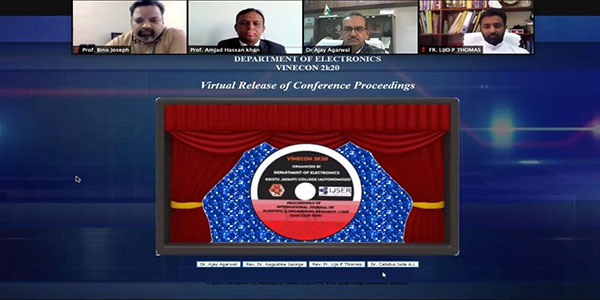
National Conference on Theoretical and Applied Statistics
Date: 23 & 24, January 2020
No of beneficiaries: 36 External and 7 internal participants, (8 out- station and 28 Bangalore participants)
Chief Guest: Shri T. Baskaran, Indian Statistical Service (Retired), Ex-Deputy Director General
The inaugural session had Shri T. Baskaran, Indian Statistical Service (Retired), Ex-Deputy Director General as the chief guest and Dr. Vidyadhar Y Mudkavi, The Head & Outstanding Scientist, CSIR Fourth Paradigm Institute (CSIR-4PI), Bangalore as the Guest of Honour. Dr. Calistus Jude, Dean of Sciences, Krirstu Jayanti College gave the welcome address. Dr. Jyothi Manoj, Convenor of the conference presented a prelude to the conference. Vice principal. Dr. Fr. Augustine George in his presidential address spoke on the rise in demand of professionals who can handle statistical analysis in the era of machine learning and artificial intelligence. Prof. Sevuga Pandian, coordinator, Department of Computer Science (UG) proposed the vote of thanks.
Session I: The resourse person for this session was Dr. Vidyadhar Y Mudkavi, The Head & Outstanding Scientist, CSIR Fourth Paradigm Institute (CSIR-4PI), Bangalore. The session emphasized that the speed at which a given scientific discipline advances will depend on how well its researchers collaborate with one another, and with technologists, in areas of Science such as databases, workflow management, visualization, and cloud computing technologies. He also spoke about how increasingly; scientific breakthroughs are powered by advanced computing capabilities that help researchers manipulate and explore massive datasets.
Session II: The resource person for this session was Dr. Ritwik Chaudhuri, Advisory Research Scientist IBM Research, Bengaluru. Dr. Ritwik gave an insight on the “Gaussian process” which is a stochastic process, such that every finite collection of a collection of random variables has a multivariate normal distribution, i.e. every finite linear combination of them is normally distributed. Kernels model the relationship between Random Variables. They are specified by a set of hyper parameters that capture broad trends in data; these are learnt from the data. Sir also discussed various numerical based on the topic, for example, representation of π (pie), Lindberg Levy Central limit theorem etc.
Session III: The resource person for this session was Prof Gangaboraiah, Professor, KIMS, Bengaluru.
He explained how every new medicine that is invented must be thoroughly tested to prove that it is not only an effective treatment for a health problem, but that it is safe for patients and does not have any side effects that are too severe. The session gave an insight on how Odds ratios are used to compare the relative odds of the occurrence of the outcome of interest (e.g. disease, Mortality rates such as maternal or perinatal). The odds ratio can also be used to determine whether a particular exposure is a risk factor for a particular outcome, and to compare the magnitude of various risk factors for that outcome. Different case studies were also discussed.
Session IV: The resource person for this session was Prof Acharya U H, Professor & Senior Specialist, SQC & OR Unit, Indian Statistical Institute, Bangalore. Prof Acharya explained the quality improvement process, and the addition of seven basic tools that any professional can use to ease the quality improvement process and can make it proceed more quickly and systematically.They are: Flowcharts, Check sheets, Pareto diagrams, Cause and effect diagrams, Histograms, Scatter diagrams and Control charts. Manufacturers must ensure that these tools are in place and being used to their full advantage as part of their quality system procedures. Flowcharts and check sheets are most valuable in identifying problems, whereas cause and effect diagrams, histograms, scatter diagrams, and control charts are used for problem analysis.
Session V: Prof. Latha, Associate Professor, Department of Statistics, Jyothi Nivas College, Bengaluru and Prof. Deepa Acharya, Head, Department of Statistics, Government Science College, Bengaluru. The objective of this session is to give the budding statisticians an opportunity to present their project work in a concise manner and motivate them to further pursue similar works. There were 6 presentations. 2 each from Christ University, Bengaluru, MES College, Bengaluru and Kristu Jayanti College.
Session VI: The resourse person for this session was Dr.Meenakshi Rajeev, Professor (Reserve Bank of India Chair), Centre for Economic Studies and Policy (CESP) , Institute for Social and Economic Change (ISEC). Dr.Meenakshi gave an elaborate insight on the topic "Modeling Loan Repayment Behaviour". She shared her experiences and stressed on the analysis of NSSO data using statistical tools. She narrated the flaws that are prevalent in collection of data since no proper orientation is provided to the enumerators. The concept of randomness itself goes violated many a times, thereby affecting various inferences and findings published. She also explained the various project opportunities for students and researchers in ISEC and RBI.
Session VII: Prof. Parameshwar V.Pandit, Professor & Head, Department of Statistics, Bangalore University, Bengaluru. The resource person introduced new rank tests for testing independence. The new testing procedures are sensitive not only for grade linear correlation, but also for grade correlations of higher order polynomials.
Session VIII: Hands on Session “Statistical Modeling using Python”
Resource Person: Prof. R. Sivasamy, Former Head, Department of Statistics, Annamalai University Professor, University of Botswana.

Third National Conference on Computational Intelligence NCCI 2019
Date: 6-12-2019 & 7-12-2019
Number of beneficiaries: 200 In-house: 150 External:50
Objective: This National Conference on Computational Intelligence (NCCI 2019) provides a platform to discuss the state-of-the-art developments, key approaches, research line, challenges and unsolved open problems encountered in the fields of Computational Intelligence.
The conference started with invocation song followed by welcome address by Dr.Calistus Jude, Dean of sciences. Vice Principal emphasized on the role played by computational intelligence and congratulated the department. Prof.Ayshwarya Baburam, Convenor NCCI-2019 gave a brief overview of the conference. The chief guest, Mr.Sanal Kumar ,Chief Architect, Huawai Technolgy , intracted with the audience by giving some brainstorming questions and highlighted the relavence of computational intelligence in the current scenario. The Conference proceedings were also released by the dignitaries. Prof.Sevaga Pandian, Staff Coordinator, thanked the participants.
Inauguration was followed by two technical sessions. In Session 1- Machine Learning with Bioinformatics by Dr. U. Srinivasulu Reddy, Assistant Professor,Department of Computer Applications,National Institute of Technology (NIT),Tiruchirappalli, Tamil Nadu, India gave an insight into the basics of Machine Learning algorithms.
In Session 2, Dr. L.Arockiam, Associate Professor & Dean, School of Computing Sciences, St.Joseph’s College(Autonomous),Trichy,Tamil Nadu,India explained the importance of IoT as a new field and gave a basic architectural structure of IoT which consists of the edge (sensors), networking (communication) and the cloud.
Track 1 Paper presentation happened on Day 1 (06-12-2019, 01:45 PM - 03.45 PM) which was chaired by Dr. L.Arockiam and Dr. U. Srinivasulu Reddy.
Day 2, 07-12-2019 started with technical Session 3 by Mr. Nishant Krishna, Architect, Researcher-IoT, Tech Machinery and More Pvt. Ltd,Bangalore, Karnataka, India. He briefed on Extelligence in the context of hyperconnectivity in IoT.
This was followed by Technical session 4 by Dr. Sujit Kumar Chakrabarti, Assistant Professor, Department of Computer Science, Indian Institute of Information Technology (IIIT), Bangalore, Karnataka, India. He gave an insight into Automated Evaluation of Programming Assignments- from Practice to Research and shared his experiences in using this system to evaluate assignments and examinations for programming courses taught in their university.
Post Lunch was Track 2 Paper Presentation chaired by Dr. L.Arockiam and Dr. R Kumar, Head, Department of Computer Science (PG) which gave extensive information and insights into Computational Intelligence and AI. The papers reflected current trends in IOT, image processing, data mining and human computer interaction, to name a few
The conference was attended by more than 200 participants( within and outside state) and total of 47 technical papers on various topics supported by Computational Intelligence were received and out of which 19 papers were presented by the authors.All accepted and presented papers will be published in Journal of Physics:Conference Series (JPCS) (ISSN: 1742 - 6588) (SCOPUS Indexed) and International Journal of Recent Technology and Engineering (IJRTE) (ISSN: 2277 - 3878) (UGC CARE List-A) (SCOPUS Indexed). Outcome : NCCI 2019 served as a platform to discuss the advances in Computational Intelligence, Security and Intenet of things (IoT). The conference provided the particiipants an opportunity to expand their network and exchange knowledge and ideas among fellow researchers, academicians and technical experts from diverse areas towards the common goal of shaping the future of the society through AI.
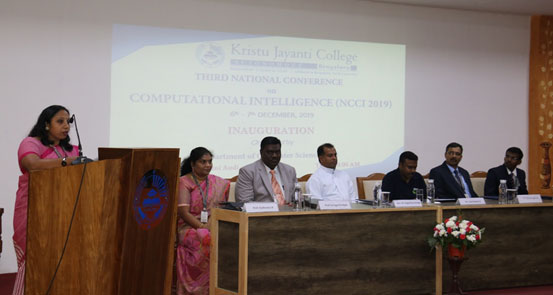
CONFERENCE ON CHANGING PARADIGMS IN TEACHING & RESEARCH IN STATISTICS
Date: 14th December 2018
No. of Beneficiaries External: 36 & In-house: 25 students +10 teachers
The Inaugural session started with a cordial welcome by Prof Sevuga Pandian, Co-ordinator, UG Department of Computer Science. The inaugural session was presided over by Rev Fr. Augustine George, Vice Principal. In the presidential address Vice Principal stressed on the requirement of network of scholars and academicians for improving the efficacy of research and appreciated the organizers and participants for being a part of the conference. The Inaugural chief guest Dr.P. G. Sankaran, Pro Vice Chancellor, CUSAT, Cochin emphasized on the scope and relevance of higher studied in Statistics. He narrated the need for in-depth knowledge in every aspect which is missing in the present generation which depends on Google and Wikipedia completely for any information. Checking the validity of information provided in internet is very essential, and hence it is always better to depend on authentic books for proper information- he commented. Dr. Jyothi Manoj, Conference Convener, proposed Vote of thanks during the session
Technical Session I
Name and details of the Resource Person: Dr.P. G. Sankaran Pro Vice Chancellor and Head and Professor, Department of StatisticsCochin University of Science and Technology Cochin - 682 022
Title: Quantile Modeling in Reliability
Objective: Quantile functions for analysis of lifetime data
The session on “Quantile Modeling in Reliability” aimed at analysis of lifetime data using quantile functions. The professor highlighted work on modelling and analysis of statistical data with probability distributions through two approaches, one using distribution function and other through quantile functions. Sir explained the concept on L’ Moments and its importance to summarize the shape of a probability distribution. Dr. P.G. Sankaran also highlighted various quantile reliability concepts and Hazard quantile functions.
Technical Session II
Name and details of the Resource Person: Prof. G. Nanjundan Professor and Head Department of Statistics Bangalore University, Bangalore
Title: Characterization of Zero-inflated Gamma Distribution
Professor explained about Zero-inflated Gamma Distribution which is characterized through a differential equation satisfied by its moment generating function. He connected it to Zero-inflated exponential distribution as a special case. Professor gave an explanation of his topic by considering a queueing system. He concluded by throwing light on zero-inflated gamma distribution as an appropriate model for the waiting time of a customer in this queueing system.
Technical Session III
Name and details of the Resource Person:Prof.Dr.K.K.Suresh Former Dean, Faculty of Science, Director School of Mathematics and Statistics Professor and Head Department of Statistics Bharathiar University Coimbatore
Title: Application of Statistical Models in Industrial Product Control
This session was about the application of Statistical models in Statistical Quality Control (SQC) technique that are used in industry and particularly in military standards for contracts and procurement of products. He highlighted the application of models in different areas like Astrostatistics, Biostatistics, Business Analytics, Chemometrics, Demography, Econometrics, Environmental Statistics, Epidemeology, Geostatistics, Operation Statistics, Population Ecology, Psychometrics, Quantitative Psychology and Reliability Engineering. Dr. K K Suresh detailed about Acceptance sampling plan, its categories and how it is designed.
Keynote Session
Name and details of the Resource Person: Dr. R.P.Suresh Principal Director – Advance Analytics, Accenture Digital, Bangalore
Title: Current Trends In Applications Of Statistics In Industry
The session was about the application of various statistical techniques in manufacturing industry, processing industry, service industry and new age industries and also the future of statistics in these fields. The session highlighted supply chain analytics, failure analytics and warranty analytics. Sir discussed one case study on warranty analytics and explained the challenge in estimating failure rate with past data, estimating failures beyond warranty period, challenges for predicting beyond warranty and displayed simulated results from exponential distribution.
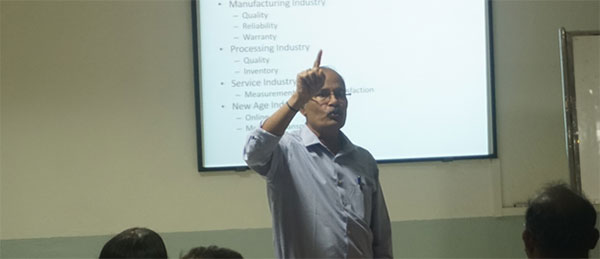
Second National Conference on Computational Intelligence
Department of Computer Science, Kristu Jayanti College, Bangalore has organized National Conference on “Computational Intelligence (NCCI-2018)” on 05.12.2018.
As has been the culture at Kristu Jayanti College – to collaboratively elevate into newer horizons of knowledge – it was with this very intent that “The Second National Conference on Computational Intelligence 2018” has seen the participation from across the nation and abroad from both Industry and Academia - to promote a research aptitude among aspiring students and to provide a stage for scholars from various facets of academia to bring forth their experience and expertise for the betterment of all. It also aided as a platform to discuss the state-of-the-art developments, key approaches, research line, challenges and unsolved open problems encountered in the fields of Computational Intelligence.
Inaugural Function
The Inaugural function of the” The Second National Conference on Computational Intelligence (NCCI-2018) organized by the Department of Computer Science, Kristu Jayanti College, Bangalore on 05.12.18,10.00AM Mini Auditorium III. Many delegates from all the over India participated in the conference.
The conference was inaugurated with Vice Principal’s message on the theme of the conference. Dr. Calistus Jude, Dean, Faculty of Sciences welcomed the gathering and Dr. Vinothina, Convener NCCI-2018 gave prelude on the conference. Mr. Jeyaseelan Jeyaraj, Senior Director – Solutions Consulting, Asia Pacific, Oracle Health Sciences, bangalore with his indispensable knowledge and experience in the field of computer intelligence and its application in the health care sector, further fortified the importance of research from the industry stand-point. Having mentioned a few future sustaining technologies, he highlighted the opportunities and areas yet to be ventured by students and scholars in these technologies. Dr. Jeyaraj brought into light the relevance of these advancements and possibilities it can open doors to, if harnessed most effectively. NCCI 2018 inaugural ceremony concluded with Dr.Cecil Doanld’s vote of thanks.
Technical Sessions
Technical Session I - The first among the two was themed ‘Re-skilling is Key to Industry 4.0 Jobs Sustainability’ by .Dr. Anbunathan, Vice-chairman (2018-19) cum Chairman-Elect (2019-20), Computer Society of India (CSI), Bangalore chapter gave insights. As the name implies, it dealt with issues, questions and probable solutions associated with the next industrial revolution to be caused by emergence and adaption of AI, machine learning, blockchain and the likes of such. It aimed at making the audience aware of these technologies and the role one would be expected to play in the very near future for job sustainability.
Technical Session II - Mr. Raja Selvaraj, Client Chief Architect, IBM Inc., Singapore provided valuable information on ‘Recent Trends in Hybrid Cloud Transformation’ - served to the curiosity of those fascinated by the emerging adaption of cloud computing. In particular, it dealt with the now-how and happening in the hybrid cloud computing sector, alongside presenting the future opportunities for both research and industry alike. The discussion extended with briefings on DevOps, cloud brokerage and server less computing to name a few.
Paper Presentations
Post Lunch session , paper presentations were chaired by Dr. S. Senthil, Associate Professor & Director, School of Computer Science & Applications, Reva University, Bangalore, Dr. SS. Manikandasaran, Director & Associate Professor, Christhuraj Institute of Computer applications, Christhu Raj College, Tiruchirappalli and Dr. Jayashree R, Professor, Department of Computer Science & Engg., PES University, Bengaluru.
The main objective of the conference was accomplished when research papers on various inter-disciplinary aspects and applications of computer intelligence were presented. A wide range of technical vocabularies, principles and practices, applications and implementations were brought to the knowledge of the witnessing audience. The paper presentations extended across three sessions and provided extensive information and insights into Computational Intelligence. All the selected and presented papers are published in conference proceedings of NCCI 2018 with ISBN. Among presented papers, many papers have been selected for publication in Journal of Physics: Conference Series, a SCOPUS indexed and UGC approved journal.
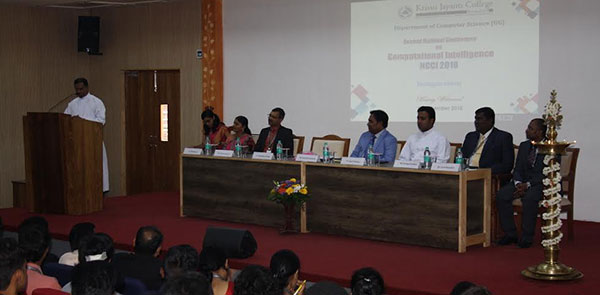
National Conference on Computational Intelligence
National Conference on “Computational Intelligence (NCCI-2017)” held on 15th Sep 2017 in association with ICT Academy Bangalore.
The main objective of this conference was to discuss the state-of-the-art developments, challenges and unsolved open problems in the field of Computational Intelligence. The conference promotes all aspects of computational intelligence theory, algorithm design, applications, and related emerging techniques. The National Conference on Computational Intelligence (NCCI-2017) will bring together leading researchers, engineers and scientists in the domain of interest across the country by providing a platform to present new advances and research outcomes in the field of Computational Intelligence
In inaugural function Dr. S.Nagarajan, Conference Convener, briefed about the objectives of the conference, themes and sub themes of the conference and number of papers received and accepted, review process, invited speakers and technical sessions of the conference. Fr.Augustine George, Vice Principal, gave message on the theme of the conference and felicitates the delegates and participants.
Prof. Balaguruswamy, Former member UPSC and Former Vice chancellor, Anna University and Chief Guest of the function released the conference Abstract proceedings and souvenir and delivered the inaugural address. In his inaugural address insist the importance of research in Artificial Intelligence & Computational Intelligence and relationship between the research and society.
Technical Session I, Dr.Seetharam Ramachandralu, Master Data Scientist, Analytics Data Labs, DXC Technology gave insights into ‘Making Decisions from Unstructured Data’. Demonstration on converting speech to text is also given during the session.
Technical Session II, Dr.Umamaheswari E, Associate professor from Vellore Institute of Technology, Chennai provided valuable information on IOT. The IoT refers to the connection of devices to the internet. The speaker explained some research problems related to healthcare and also gave theoretical explanation on IOT.
Post Lunch session, paper presentations were chaired by Dr.Hanumanthappa.M, Professor and IT Head, Department of Computer Science and Applications, Bangalore University, Bangalore and Dr. M. Krishnamurthy, Professor & Head, Department of Computer Science & Engg., KCG College of Technology, Chennai. The paper presentations extended across two sessions and provided extensive information and insights into Computational Intelligence. The papers reflected current trends in neural networks, image processing, data mining and human computer interaction, to name a few. The Conference saw the participation from around 26 colleges with nearly 140 participants from in and around Bangalore and from 2 outside the state.
Dr.M.Ranjitha, Co-Convenerpresented a report of the proceedings of the conference. Fr.Josekutty, Principal, Kristu Jayanti College delivered the Felicitation. Dr. M. Krishnamurthy, Professor & Head, Department of Computer Science Engineering, KCG College of Technology, Chennai, delivered the valedictory Address. He narrates about importance of two R (Result and Research) in Educational Institutions. The speaker briefed about the how the research paper should be prepared and what are the preliminary works has to be done by individual researcher while starting the new research. He also explained how an Educational institution forms the new research Centre. Fr.Lijo P.Thomas, Conference Chair distributes the Best Paper Award. Feedback was received from the few participants.
